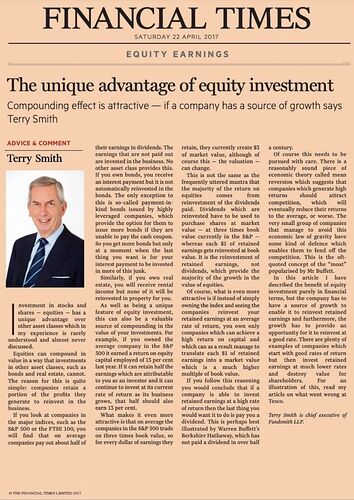In this insightful article by Terry Smith, the chief executive of Fundsmith LLP, the unique advantage of equity investments is brought to light. Smith highlights how equities, unlike bonds or real estate, allow for compounding through retained earnings. This reinvestment of profits is what makes equity a powerful asset class for long-term growth, a feature that is often overlooked.
Here are some key takeaways:
-
Retained Earnings Drive Growth:
Companies retain a portion of their profits and reinvest them back into the business, creating additional value. Smith explains that for every dollar retained by companies in the S&P 500, there is a corresponding $3 increase in market value—a testament to the power of retained earnings. -
Equities Outperform Bonds and Real Estate:
While bonds pay interest and real estate generates rental income, neither reinvests earnings automatically. This limitation caps their growth potential compared to equities, where reinvested profits enable compounding over time. -
High Returns on Retained Capital:
Smith emphasizes that high-quality companies achieve superior returns on retained capital. For example, the S&P 500 average return on capital employed was 13%. Companies capable of reinvesting at such rates consistently outperform over the long term. -
The Risk of Mean Reversion:
However, not all retained earnings translate into growth. Smith cautions that companies generating high returns often face competition and economic pressures, which can erode their advantages over time. He stresses the importance of investing in businesses with a “moat,” as popularized by Warren Buffett, to shield against these forces. -
Dividends vs. Reinvestment:
While dividends can be attractive, Smith argues that companies with a solid reinvestment track record often create greater value for shareholders. Berkshire Hathaway is a prime example, having not paid a dividend in over 50 years while delivering consistent returns through retained earnings. -
Quality Over Quantity:
Not all companies reinvest retained earnings effectively. Investors need to focus on businesses with a high return on capital and a clear path for sustainable growth. Blindly following companies with high dividends or reinvestment rates without analyzing their efficiency can lead to subpar outcomes.
Smith’s article reinforces the importance of compounding and the role of retained earnings in wealth creation through equities. It provides a framework for investors to focus on quality businesses with sustainable growth potential while avoiding those that destroy shareholder value through poor capital allocation.
Question for the Community:
What’s your strategy when evaluating a company’s ability to reinvest retained earnings effectively? Do you prioritize dividends, or do you prefer companies that focus on compounding through reinvestment? Let us know your thoughts!
